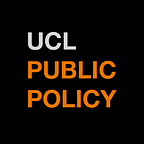Public Policy Engagement Training: Impact Insights and Next Steps
Audrey Tan discusses how to facilitate engagement between researchers from under-represented backgrounds and policy professionals.
© UCL Media Services — University College London
Challenges to getting your foot in the proverbial ‘academic-policy engagement’ door
As of March 2022, women represented only 35% of the Members of Parliament (MPs) in the House of Commons and 29% of the Peers in the House of Lords. Additionally, while the latest figures highlight that ethnic representation of MPs is beginning to reflect the population (13.8% of the UK population are from a minority ethnic background as are 10% of MPs), a dismal 6% of Peers are from a minority ethnic background.
This lack of visible diversity amongst decision-makers speaks to related structural and cultural barriers that researchers, particularly early career researchers (ECRs) and people from under-represented backgrounds, face when seeking to engage with policy professionals. Two key barriers that we observed in UCL Public Policy were the lack of tailored training for these groups and lack of monitoring data to benchmark diversity and accessibility efforts.
Our response: the Public Policy Engagement Masterclass Series
Recognising that barriers exist and keen to dismantle them, we used our institutional Wellcome Trust funding to develop and launch the UCL Public Policy ‘Public Policy Masterclass Series’ during the Spring term of 2020. The series sought to work with people from under-represented groups and ECRs to increase their skills, knowledge and confidence to participate in academic-policy engagement. The series was open to UCL and non UCL students, staff, researchers and academics. Over 200 people took part with over 60% of attendees from each session indicating they were an ECR and/or from an under-represented group.
Did it work?
Keen to explore what impacts the training was having and ultimately see if it was breaking down barriers, we circulated a Training Impact Survey and undertook focus groups. 69% (34/49) of respondents were early career researchers, 55% (27/49) were from under-represented groups, and 35% (17/49) were both early career researchers and from an under-represented group.
Participants reported undertaking a number of policy-related activities as a result of attending the training (Graph 1). The most frequently reported were writing a policy brief/research insight/evidence note, arranging meetings with policy professionals and attending a conference with links to policy. During the focus groups, participants revealed that they found it reassuring to know that others found initiating policy engagement overwhelming, but that the training gave them the confidence to engage.
The respondents also reported increased knowledge and confidence (self-assessed on a 5-point Likert scale) in the benefits of engaging with public policy and presenting research in different contexts for different audiences. This increase in knowledge and confidence also emerged in the focus groups. One participant shared that the training, ‘gave me concrete parameters and more direction and focused thinking on exactly what is policy impact and what is policy.’ Indeed, several participants said that they intend to apply for policy fellowship opportunities to further enhance their policy knowledge and gain more direct experience with how policies are developed. Others are inspired to pursue networking opportunities so they can learn from diverse perspectives and collaborate to develop more complex projects.
A sustainable resource: the Public Policy Engagement Online Series
Based on the findings from the Training Impact Survey and focus groups, as well as our goals to scale the programme, we have since developed the live Masterclass Series into a 6-module Public Policy Engagement Online Series on UCL eXtend, a freely available platform open to those within and beyond UCL. Keen for our modules to be inclusive and offer the tailored support for under-represented groups, we have ensured that every recording, activity and resource in the Series meets accessibility standards and have included case studies and examples from people with a diversity of backgrounds.
Lessons learned
The Masterclass Series and Online Series were developed to address demand for foundational policy engagement training. Whilst we are now meeting this demand, we are aware that there are gaps in our training provision, namely around international policy engagement and training for those at mid- or senior-career levels.
To address these needs, we have partnered with UCL’s Global Engagement Office and the European Institute. Funded through the Office of the Vice-Provost (Research, Innovation & Global Engagement ) Collaborative Impact Grant we are working together to extend UCL’s global policy engagement offer through mapping existing global policy engagement activities, coordinating pilot training and convening external roundtables. This project is creating new opportunities to share knowledge and good practice across faculties and generating sustainable learning resources that will support academics reach their international policy engagement goals.
Additionally, UCL Public Policy is also collaborating with the Public Engagement and Research Impact and Curation Services teams in RIGE to align our training offers and create a cohesive programme throughout the 2022–2023 academic year. By working with these other professional services departments, we will be able to leverage our collective expertise to better support academics across the engagement pipeline and beyond the early stages of their careers. Our hope is that academics who participate in our training will not only feel like the door to academic-policy engagement been opened, but that they can have their two feet firmly planted inside.
_____________________________________________________________
More about the author
Audrey Tan is public policy engagement facilitator, UCL Public Policy, UCL.
